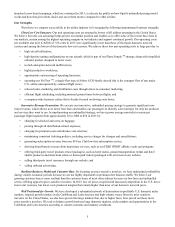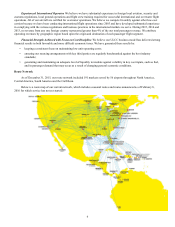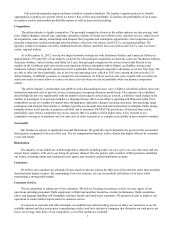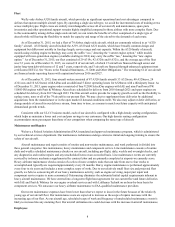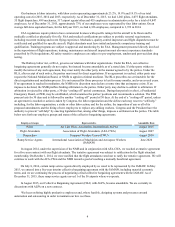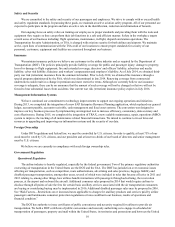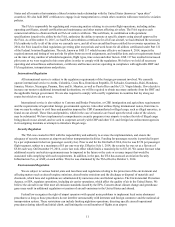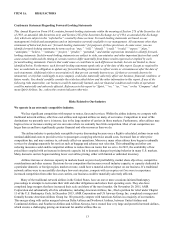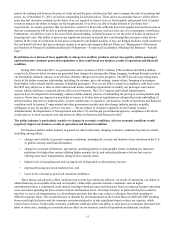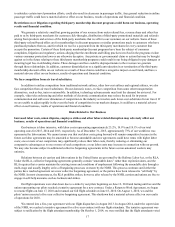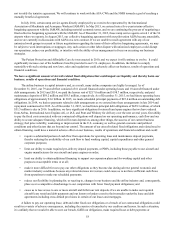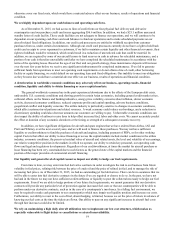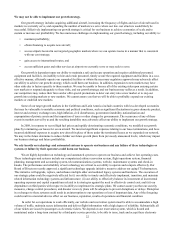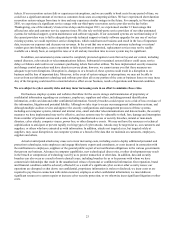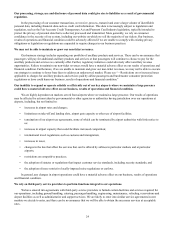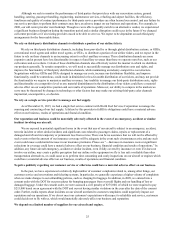Spirit Airlines 2015 Annual Report Download - page 15
Download and view the complete annual report
Please find page 15 of the 2015 Spirit Airlines annual report below. You can navigate through the pages in the report by either clicking on the pages listed below, or by using the keyword search tool below to find specific information within the annual report.15
protect the refining risk between the price of crude oil and the price of refined jet fuel, and to manage the risk of increasing fuel
prices. As of December 31, 2015, we had no outstanding jet fuel derivatives. There can be no assurance that we will be able to
enter into fuel derivative contracts in the future if we are required or choose to do so. Our liquidity and general level of capital
resources impacts our ability to hedge our fuel requirements. Even if we are able to hedge portions of our future fuel
requirements, we cannot guarantee that our derivative contracts will provide sufficient protection against increased fuel costs or
that our counterparties will be able to perform under our derivative contracts, such as in the case of a counterparty’s insolvency.
Furthermore, our ability to react to the cost of fuel, absent hedging, is limited because we set the price of tickets in advance of
incurring fuel costs. Our ability to pass on any significant increases in aircraft fuel costs through fare increases could also be
limited. In the event of a reduction in fuel prices compared to our hedged position, if any, our hedged positions could counteract
the cost benefit of lower fuel prices and may require us to post cash margin collateral. Please see “Management’s Discussion
and Analysis of Financial Condition and Results of Operations—Trends and Uncertainties Affecting Our Business—Aircraft
Fuel.”
Restrictions on or increased taxes applicable to charges for ancillary products and services paid by airline passengers
and burdensome consumer protection regulations or laws could harm our business, results of operations and financial
condition.
During 2015, 2014 and 2013, we generated non-ticket revenues of $972.1 million, $786.6 million and $668.4 million,
respectively. Our non-ticket revenues are generated from charges for, among other things, baggage, bookings through certain of
our distribution channels, advance seat selection, itinerary changes and loyalty programs. The DOT has rules governing many
facets of the airline-consumer relationship, including, for instance, price advertising, tarmac delays, bumping of passengers
from flights, ticket refunds and the carriage of disabled passengers. If we are not able to remain in compliance with these rules,
the DOT may subject us to fines or other enforcement action, including requirements to modify our passenger reservations
system, which could have a material adverse effect on our business. The U.S. Congress and Federal administrative
agencies have investigated the increasingly common airline industry practice of unbundling the pricing of certain products and
services. If new taxes are imposed on non-ticket revenues, or if other laws or regulations are adopted that make unbundling of
airline products and services impermissible, or more cumbersome or expensive, our business, results of operations and financial
condition could be harmed. Congressional and other government scrutiny may also change industry practice or public
willingness to pay for ancillary services. See also “—We are subject to extensive regulation by the Federal Aviation
Administration, the Department of Transportation and other U.S. and foreign governmental agencies, compliance with which
could cause us to incur increased costs and adversely affect our business and financial results.”
The airline industry is particularly sensitive to changes in economic conditions. Adverse economic conditions would
negatively impact our business, results of operations and financial condition.
Our business and the airline industry in general are affected by many changing economic conditions beyond our control,
including, among others:
• changes and volatility in general economic conditions, including the severity and duration of any downturn in the U.S.
or global economy and financial markets;
• changes in consumer preferences, perceptions, spending patterns or demographic trends, including any increased
preference for higher-fare carriers offering higher amenity levels, and reduced preferences for low-fare carriers
offering more basic transportation, during better economic times;
• higher levels of unemployment and varying levels of disposable or discretionary income;
• depressed housing and stock market prices; and
• lower levels of actual or perceived consumer confidence.
These factors can adversely affect, and from time to time have adversely affected, our results of operations, our ability to
obtain financing on acceptable terms and our liquidity. Unfavorable general economic conditions, such as higher
unemployment rates, a constrained credit market, housing-related pressures and increased focus on reducing business operating
costs can reduce spending for price-sensitive leisure and business travel. For many travelers, in particular the price-sensitive
travelers we serve, air transportation is a discretionary purchase that they may reduce or eliminate from their spending in
difficult economic times. The overall decrease in demand for air transportation in the United States in 2008 and 2009 resulting
from record high fuel prices and the economic recession required us to take significant steps to reduce our capacity, which
reduced our revenues. Unfavorable economic conditions could also affect our ability to raise prices to counteract increased fuel,
labor or other costs, resulting in a material adverse effect on our business, results of operations and financial condition.


